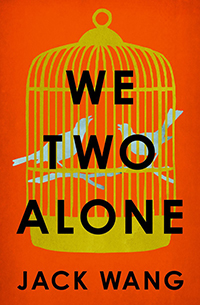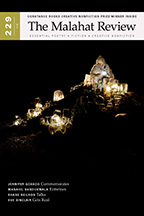Reviews
Fiction Review by Grace Lau
Jack Wang, We Two Alone (Toronto: Anansi, 2020). Paperbound, 296 pp., $19.95.
 We Two Alone is a beautiful collection of stories that take place in different time periods and countries. Individually, they are poignant stories about love, family—and hockey!—but together they masterfully illustrate how dramatically different the lives of the Chinese diaspora are. From Canada to Austria to South Africa, the countries that Wang has chosen as backdrops aren’t always the ones people think of when they think of Chinese immigrants. And the characters’ aspirations and careers vary as widely as their geographies. Even as a Chinese person, to see this kind of variety is truly eye-opening and invigorating.
We Two Alone is a beautiful collection of stories that take place in different time periods and countries. Individually, they are poignant stories about love, family—and hockey!—but together they masterfully illustrate how dramatically different the lives of the Chinese diaspora are. From Canada to Austria to South Africa, the countries that Wang has chosen as backdrops aren’t always the ones people think of when they think of Chinese immigrants. And the characters’ aspirations and careers vary as widely as their geographies. Even as a Chinese person, to see this kind of variety is truly eye-opening and invigorating.
In “The Nature of Things” and “The Night of Broken Glass,” Wang tells of survival during the Rape of Nanking and Kristallnacht. But Wang infuses details and layers into both that make them more than just war stories; they are also love stories and stories of family. Still, the fear in them is constant and palpable, like an engine humming steadily in the background. Above all, these stories show how survival doesn’t always look like survival when you’re doing it—and though death can happen in an instant, loss does not necessarily do so. It is often a process. You can lose someone over weeks, even months, as many of these characters do. So often, the bumps and pitfalls experienced during war are smoothed over and obscured by history books. Wang holds these to the light as he exquisitely captures the feeling of being an outsider. Even though these characters speak German or Afrikaans perfectly and dress the part, they’re never able to assimilate, never truly comfortable.
And as Wang adeptly shows, it’s not just “starting over” in a new country that’s hard. That is, undoubtedly, not a hardship unique to Chinese immigrants, but the characters in Wang’s stories endure a special brand of humiliation and loss of dignity, the shadow of which still follows many Chinese immigrants today.
“The Valkyries” is a touching story of a poor boy, Nelson, who works with his uncle at the neighbourhood laundromat in Vancouver. He loves hockey, but can’t play for the boys’ team because he’s Chinese. So he digs up his mother’s old clothes and joins the girls’ team in disguise. Also on the team is Tessa: white, upper class, and terrific at hockey. Tessa and Nelson (now “Nellie”) eventually develop feelings for each other, though Tessa believes Nelson to be a girl. Tessa’s actions and words strongly indicate that she is lesbian; she tells Nellie that “In Paris there’s an art collector—she’s a writer, too—and she lives with a woman and everyone knows, it’s all out in the open. We don’t have to be afraid.” Tessa reciprocates Nelson’s/Nellie’s crush—because she believes Nelson to be a girl. They have many stolen moments and kisses, and, ultimately, Nelson decides to continue lying to Tessa in the hope that she’ll develop genuine feelings for him (or no longer be gay, whichever seems more likely). Nelson realizes that this isn’t right: “… he gave into the lavish impossibility of it all, even though what he was doing amounted to a kind of theft.”
And yet, this is the justification that follows: “It ain’t stealin’ if you’re owed.” For me, as a gay Chinese woman, this moment stings. Is Nelson owed anything? As a Chinese immigrant who’s grown familiar with Canada’s racist history only well after I left school, I cannot entirely disagree. Yes, much is owed, not only to the Chinese people
on whose backs the railroad was built, but also to the Indigenous peoples on whose land and homes those tracks were laid. Who owes him? As a woman, this line eats at me. Does any girl owe any boy her love, or even a kiss, simply because she is wealthy and white? To add insult to injury, Wang compares a moment of vulnerability that Tessa offers—because she believes Nelson to be a girl—to a stolen streetcar ride and “filched penny candy.” I wish very much that what Nelson tried to claw back from a cruel, unforgiving world didn’t come at the emotional expense of a girl who would have to make her own way in that same world after she comes out.
So what is Nelson owed? What price must be paid for systemic and constant humiliation, doled out on the basis of the colour of someone’s skin and the language they speak? This is the fascinating thing about intersectionality. Yes, these are Chinese stories and, yes, they make me, a Chinese person, feel a deep sense of nostalgia and familiarity with their characters. But we as people are multifaceted, and our identities and struggles exist on so many levels. Even so, “The Valkyries” is a deeply vulnerable examination of Chinese masculinity in a racist Western world. Nelson’s only father figure rages at him, “All my life, I’ve fought to be a man,” when he finds out about Nelson’s stint on the girls’ hockey team, and though it’s not a theme that Wang delves too deeply into here, this statement succinctly captures the bitterness and pain when racism and sexism intersect. And you can tell how passionate Wang is about hockey. He describes girls’ hockey masterfully, and makes it every bit as thrilling as the announcers make an NHL game (and they have the added advantage of sound). It’s both refreshing and impressive.
There’s no shortage of pain and struggle in We Two Alone, but they are grounded in the everyday, not treated like an insurmountable adversity. They are brutal but mundane—which makes them possible to overcome, whether one is a diplomat, or a semi-pro hockey player, or a failing actor. And that is precisely what provides hope: that no matter which country we (or our parents) left and where we’ve ended up, we may not be so alone after all.
—Grace Lau









